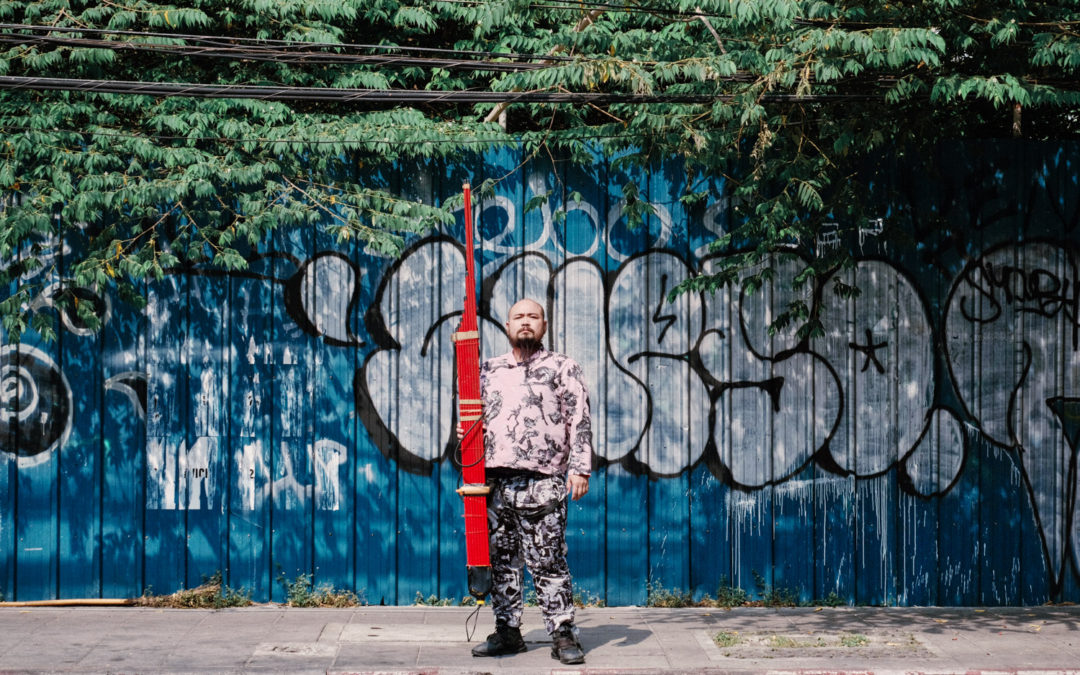When you think of Thailand, you’re likely to picture the country’s iconic smiles, countless temples, endless fruits and incredibly beautiful islands. Despite those otherwise reductive attributes, it is important to remember that Thailand is not a paradise. This country has experienced 13 military coups since 1932 – more than any other country in modern history – and its all-powerful army continues to grossly interfere with freedom of speech and press freedoms. It is not easy for ordinary people to openly discuss politics in Thailand, and in attempting to, they are likely to tempt censorship and persecution.
But the Thai musician/visual artist Pisitakun, who we’re thankful to have discovered online this year, uses experimental music as a medium to express his political views in both a fierce but playful way. His latest album, “Absolute C.O.U.P.” is a work that confronts and experiments with Thailand’s history of violent and repeated deposition of power. Pisitakun has done this by collecting the sounds, voices, samples and songs that relate to Thailand’s coup d’états and pieced them together to create something wholly new. “Each song represents the part of [the military] structure that supports the coup,” he says.

This album pulls from a wide array of musical references – by using everything from traditional to officially sanctioned songs (the record with a jittery and bombastic version of Thailand’s royal anthem), Pisitakun utilizes a blend of woozy maximalism and driving beats to create a sense of disorientation so that, in his words, “you never know when it will change, when it will be fun when it will be sad. It is like a coup in that you never know what will happen in the future. Only the one that makes the coup can know.”

Absolute C.O.U.P. will be available to buy on cassette or as a gold bullet-shaped USB stick – a subversive nod to the power and wealth of the Thai military elite. To accompany the recording, Pisitakun has painted an image to visually represent each song, which will be included as stickers with the physical release.

Absolute C.O.U.P. is available to pre-order as a USB, tape or digital download via Chinabot
We spoke to Pisitakun about the origin of his new album – and more importantly – get his take on the current state of Thailand’s political environment and where that leaves outspoken artists and activists like himself.
Subtropical Asia: Much of your work addresses corruption and Thailand’s political history but unlike something like a painting or poetry, it’s not as obvious. Do you find you have more freedom to express your opinions through electronic music? What’s the difference in how authorities and avid music listeners react?
Pisitakun:Most of my artwork after the Thai military crackdown in 2010 revolves around history and politics. I have tried using media art to talk about political problems, but because media art conceptualizes every detail in the artwork, it’s difficult to expand on some topics. There are some limits with the audience with media art because art history and theory can create boundaries, but I still enjoy the process, and I sometimes apply this process to my music.
The process of making music is very different. I started making music in 2015. For me, music has more freedom to surpass the rules that media art has. As you may know, I have never studied music, so I don’t know music theory or the rules of composing sound. Sound is not as easy to conceptualize, sound is something your ears pick up as vibrations, and from this, the audience will get a feeling, or interpret their own meaning from the sound.
As far as how authorities versus music listeners react to my music, the authorities are always on the lookout to find something to censor, but they don’t understand what exactly the music is about . They can only understand it when journalists break down an art piece or music. But for listeners, they are more seeking enjoyment, and so can appreciate the many details and layers of music.

In the log line for the new release you ask: “Why do we (Thailand) have so many coups?” Has producing this album helped you answer your question in any way? How so?
For this album, I tried to research the question: Which institutions are connected to and support the coups, and why are they so powerful in Thailand? I found that most of them received their privilege and power in significant ways. In my album, each song addresses a different institution that benefited from the coups. For example, the song ‘ConConStituStitutionalCourt’ is about the Constitutional Court, which is a tool of the coup used to control or dissolve democracy. Some songs talk about the groups that created specific conditions which allowed the coups in Thailand to happen. Producing this album has provided many answers, but more than that, I hope to bring music into the political movement in a contemporary way.
-You unabashedly express your political opinions through music and art, and your views are sharp and critical, which are definitely not the same as how ordinary people perceive Thailand. Have you encountered any problems such as warnings from the authorities
or political censorship?
Hahaha, yeah, I’ve had a lot of problems with this. Sometimes, friends of mine tell me I should stop doing risky things because they’re worried about the police or the army. In 2018, I actually had to close my exhibition because the police and army came to shut it down. They even kept my artwork, like an art collector, but they still haven’t paid me!

– I see your approach to music as confrontational, particularly in your use of samples – would you agree? What samples did you seek out specifically for your latest album?
Yes, I would agree. I use lots of samples related to politics, like clips from YouTube or a news clip of a speech from the coup d’etat group in 2014. I also mix many sounds from the traditional music of the northeast (known as ‘Isaan’), the south, and the north of Thailand to create a new sound.
– While your music could be described as jarring, I find there’s a playfulness to the way you splice everything together – where do you believe you inherited this anarchist spirit from?
Oh, definitely! There is a very playful element to my music because I want the first impression for listeners to be that of enjoyment, rather than a punch in the face. There are many layers to each song. You will hear the sound first. Then when you listen more closely, you will hear the meaning of the song. Then at a deeper level, you will start to feel something, maybe that punch in the face, jarring feeling. In the end, even if someone doesn’t understand Thai, their own experiences will guide them to take away their own message from the music.
-What’s the biggest social issue in Thailand or let’s say what concerned you most? Is censorship a common thing in Thailand? What do they censor usually? And how is the normal Thai people react to the censorship?
One of my biggest concerns about Thailand is its monarchy. Our monarchy is intertwined with the democratic system, and most of the censorship is related to the monarchy. Thailand has Lese-majeste law Article 112. People can be imprisoned for a minimum of 3 years for criticizing the King! Here’s an example of recent news – a man wore a T-shirt that said ‘We lost faith in the monarchy’, but the police couldn’t arrest him because he didn’t exactly criticise anything. But the police sent him to a psychiatric hospital where he might stay for up to 2 months.
– What makes you so brave and outspoken?
I think many musicians are concerned with politics, but they don’t want to speak about it in their music, especially in pop, dance, or experimental music. In the 60s and 70s, we had so many folk songs about politics in southeast Asia, that I think lots of people became bored with it. But for me, when I try to bring politics into contemporary music, it’s so fun for me to work with. Some might think, ‘You talk too much about politics, it’s so boring man!’ They might think politics is boring, but they will definitely be affected by it – there’s no choice in the matter. I’d like to bridge this gap to show that politics can be fun and contemporary. I hope to manifest a political movement through music – not just through lyrics, as most previous political songs have done, but through the musical process, where the audience can derive their own ideas and meanings.

– This isn’t the first time you’ve worked with Chinabot – how do your sensibilities align with the label?
I’m very comfortable working with Chinabot. When Saphy, the founder of Chinabot, was young, he also was affected by the politics in Southeast Asia. I feel they have an understanding of politics and culture in Asia which aligns with my music.
Learn more about Pisitakun, follow him on Instagram
Enjoyed this article? Like Subtropical Asia on Facebook or follow us on Instagram.

